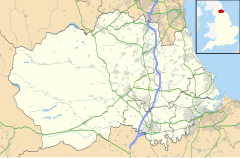Tow Law
| Tow Law | |
|---|---|
 High Street, Tow Law, A68 |
|
| Tow Law shown within County Durham | |
| Population | 2,138 (2011) |
| OS grid reference | NZ119393 |
| Unitary authority | |
| Ceremonial county | |
| Region | |
| Country | England |
| Sovereign state | United Kingdom |
| Post town | BISHOP AUCKLAND |
| Postcode district | DL13 |
| Dialling code | 01388 |
| Police | Durham |
| Fire | County Durham and Darlington |
| Ambulance | North East |
| EU Parliament | North East England |
| UK Parliament | |
Tow Law /taʊˈlɔː/ is a town and civil parish in County Durham, England. According to the 2001 census it had a population of 1,952, increasing to 2,138 at the 2011 Census. It is situated a few miles to the south of Consett. Tow Law Town football team are based in the town. The town constituted an urban district from 1894 until 1974. The town is mentioned in the Mark Knopfler song "Hill Farmer's Blues" from his album The Ragpicker's Dream.
The name "Tow Law" is from the Old English tot hlaw meaning "lookout mound," the name of a house which stood there before the iron works and the village were built.
The main road through the town is the A68 which starts near Darlington and goes on up to Dalkeith.
Since December 2001 the town has had a 2.3 MW wind farm consisting of three 50 m (160 ft) high wind power turbines. During the 2001 foot and mouth crisis, MAFF buried diseased animals at the former Inkerman Pit site. This was an emotive issue for local residents, who were disturbed by vehicle movements and smells from the pit. Many protesters attended the site every day for six months but had no effect and Defra continued to keep the site operational until the spring of 2002.
...
Wikipedia

